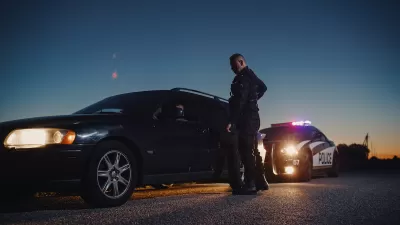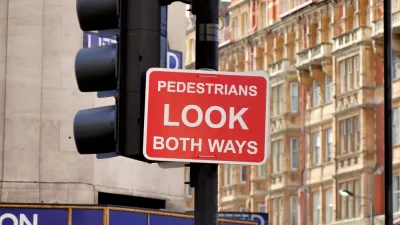Two studies bear out the idea that Black people face continued discrimination in transportation. They drive cautiously to avoid discriminatory traffic enforcement, and they're less likely to get picked up by rideshare.

Amid increased racial rhetoric, Joe Cortright calls attention to the diversity of our lived experiences, even in regular day-to-day transportation. Traffic stops are one problem area. "African-Americans are much more likely than other drivers to be pulled over for routine traffic infractions. Federal data on traffic stops show a clear difference by race: Black drivers are about 31 percent more likely to be pulled over for a traffic infraction than white drivers."
Cortright notes a recent study on transportation system performance, finding that Black drivers, on average, are more cautious than other groups, probably because they fear discriminatory enforcement. "If each year of age reduces your average speed by about three-tenths of one percent, that means that the typical black driver travels at about the same speed as a white driver who is about 26 years older. For example, a 25 year-old black driver would, according to these estimates, be expected to drive about as fast as a 51 year-old white driver."
In another study, researchers looked at rideshare services through a demographic lens. "In theory, at least one of the advantages of [...] computer-based ride-hailing services such as Lyft and Uber is that they should be more race blind."
Nevertheless, the study finds that "drivers for ride-sharing services are prone to discriminate against African Americans, making blacks wait longer for rides when they can identify the race of the ride-hailer and more frequently cancelling rides when alerted to African American-sounding names."
FULL STORY: Race & transportation: Still a long way to go

Alabama: Trump Terminates Settlements for Black Communities Harmed By Raw Sewage
Trump deemed the landmark civil rights agreement “illegal DEI and environmental justice policy.”

Study: Maui’s Plan to Convert Vacation Rentals to Long-Term Housing Could Cause Nearly $1 Billion Economic Loss
The plan would reduce visitor accommodation by 25% resulting in 1,900 jobs lost.

Planetizen Federal Action Tracker
A weekly monitor of how Trump’s orders and actions are impacting planners and planning in America.

Waymo Gets Permission to Map SF’s Market Street
If allowed to operate on the traffic-restricted street, Waymo’s autonomous taxis would have a leg up over ride-hailing competitors — and counter the city’s efforts to grow bike and pedestrian on the thoroughfare.

Parklet Symposium Highlights the Success of Shared Spaces
Parklets got a boost during the Covid-19 pandemic, when the concept was translated to outdoor dining programs that offered restaurants a lifeline during the shutdown.

Federal Homelessness Agency Places Entire Staff on Leave
The U.S. Interagency Council on Homelessness is the only federal agency dedicated to preventing and ending homelessness.
Urban Design for Planners 1: Software Tools
This six-course series explores essential urban design concepts using open source software and equips planners with the tools they need to participate fully in the urban design process.
Planning for Universal Design
Learn the tools for implementing Universal Design in planning regulations.
Caltrans
Smith Gee Studio
Institute for Housing and Urban Development Studies (IHS)
City of Grandview
Harvard GSD Executive Education
Toledo-Lucas County Plan Commissions
Salt Lake City
NYU Wagner Graduate School of Public Service





























